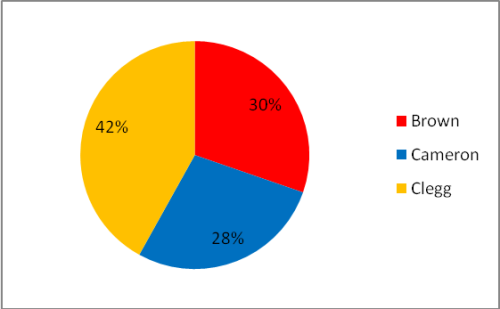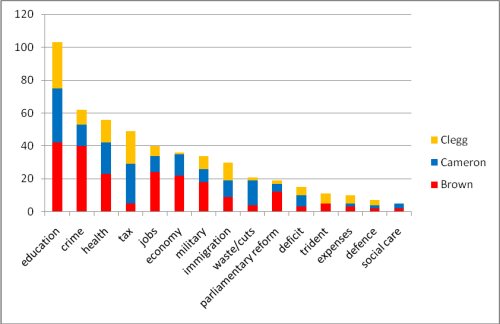The NPCU is collaborating with Linguamatics, a leader in enterprise text mining, to carry out social media analysis through a series of events in 2010, including the TV election debates. Below are preliminary results of Linguamatics' linguistic analysis of 211,000 tweets sent by 47,420 twitterers from 8.30pm - 10pm on the night of the first UK election debate, April 15 2010.
The overall tweet analysis (Figure 1) shows that 65% of twitterers who expressed an opinion said that Nick Clegg performed best, followed by Gordon Brown (21%), and then David Cameron (14%). In contrast, the immediate post-debate poll by Sun/YouGov put Clegg ahead at 51%, Cameron at 29%, and Brown at 19%.




Figure 1 - Number of tweets showing positive sentiment towards each party leader
The twitterati also indicated that their top 5 issues were health, immigration, economy, education and crime, with Cameron winning on health, Clegg on immigration and education, and Brown on economy and crime (Figure 2). However, the combined analysis of winner per topic showed that the leaders were more evenly split (Figure 3) than for the debate as a whole (Figure 1).

Figure 2 - Winner per topic from number of relevant positive tweets

Figure 3 - Percentage of specific topics won by each leader
Linguamatics' linguistic analysis of the debate transcript itself (Figure 4) shows that the leaders talked about education most, followed by crime, health, tax and jobs, which revealed different priorities than for the twitterati.

Figure 4 - Words spoken about a particular topic per speaker
Commenting on these preliminary results, John M. Brimacombe, Executive Chairman of Linguamatics said: "For Twitter, we've demonstrated an objective way to detect real world opinion as it develops. However, this ability to filter huge volumes of text in real time has implications for decision-makers across the board."
Rather than only searching for specific keywords, Linguamatics uses natural language-based querying to find and summarize tweets that have the same meaning, however they are worded. The I2E text mining software developed at Linguamatics has been deployed by top-10 pharmaceutical companies since 2003 to analyze high volumes of information and drive decision making. Linguamatics has now adapted this technology for real-time social media analysis. I2E can automatically discover the wide-range of vocabulary used in tweets, including topic tags, and use linguistic processing to collect and summarize the thousands of ways people have of saying the same thing.
More analysis to follow the last two debates, and a detailed survey will follow the election itself. For further information please contact Ben.OLoughlin@rhul.ac.uk.
